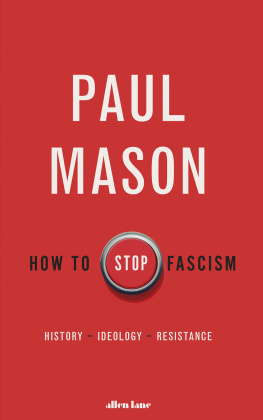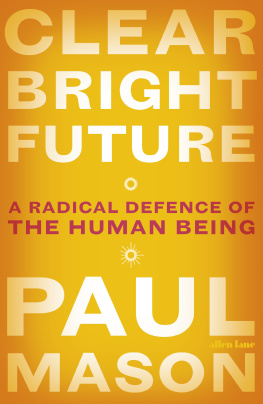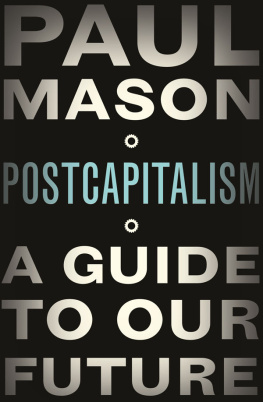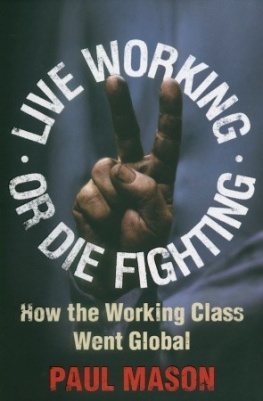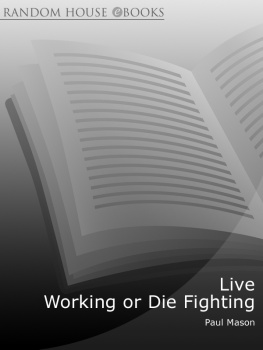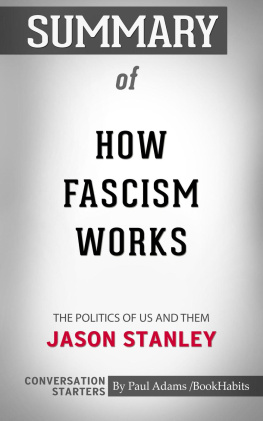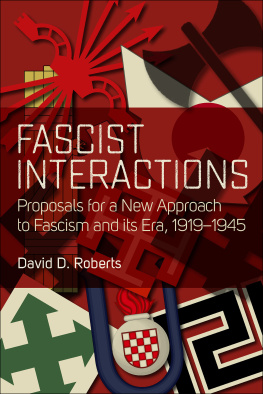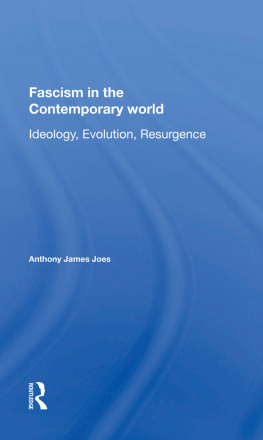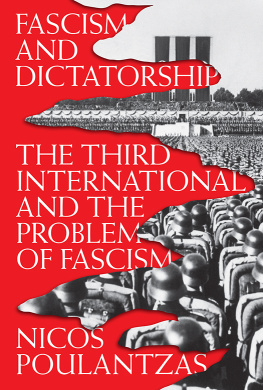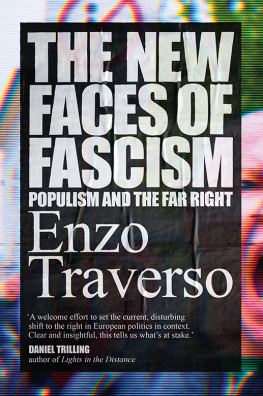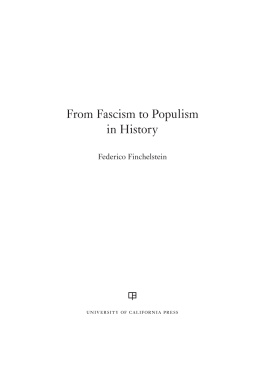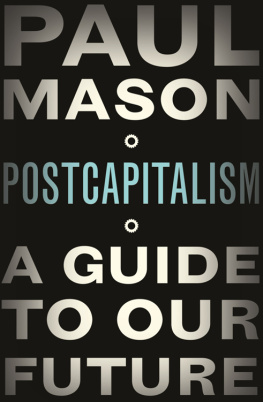Paul Mason
HOW TO STOP FASCISM
History, Ideology, Resistance

PENGUIN BOOKS
UK | USA | Canada | Ireland | Australia
New Zealand | India | South Africa
Penguin Books is part of the Penguin Random House group of companies whose addresses can be found at global.penguinrandomhouse.com.

First published by Allen Lane in 2021
Copyright Paul Mason, 2021
The moral right of the author has been asserted
Cover Design: Keenan
ISBN: 978-0-141-99641-7
This ebook is copyright material and must not be copied, reproduced, transferred, distributed, leased, licensed or publicly performed or used in any way except as specifically permitted in writing by the publishers, as allowed under the terms and conditions under which it was purchased or as strictly permitted by applicable copyright law. Any unauthorized distribution or use of this text may be a direct infringement of the authors and publishers rights and those responsible may be liable in law accordingly.
To the anti-fascists past, present and future
History teaches us the deathlessness of ideas.
Karl Loewenstein, anti-fascist lawyer, 1937
Introduction
Nazis: Theyre Back But Why?
What if the Nazis invented a time machine? And in the last weeks of the Second World War, they decided to send a crack SS team into the future, to create a Fourth Reich? What year do you think they would aim for?
Seventy-five years is a round number; most witnesses to the Holocaust would be dead by then. So, lets do a thought experiment: suppose a group of Nazi time-travellers materializes in Europe in March 2020. They are shocked at the ultra-liberalism of Western society; they marvel at our digital technologies; they discover to their horror that black American music has conquered the world. But then
They watch Hindu mobs in Delhi beating left-wing students with iron bars. They see the far-right Vox party flood the Spanish media with violent rhetoric against migrants, feminists and the left, gaining 3 million votes in the process. They discover that 1 million Chinese Muslims are interned in something very like concentration camps, and that nobody cares.
Once they figure out the internet, and work out what a meme is, a cartoon frog saying Honk Honkler makes them smile. Their smiles broaden as they read that a German army unit has been dissolved because it is irreparably infiltrated by neo-Nazis. Digging deeper, they realize that all the ideas in their own heads racial purity, male supremacy, anti-Semitism and leader-worship are circulating globally on Discord channels and WhatsApp groups between millions of angry people.
As they acclimatize, they realize something even bigger is brewing. Theres a disease. It is killing people. As the Covid-19 virus rips through America, they watch far-right demonstrators take to the streets, some armed with automatic rifles, protesting for the right to catch it.
George Floyd is murdered. The alt-right bulletin boards seethe with anticipation: this is it, Boogaloo, the white supremacist codeword for a second American Civil War. As tens of thousands march to protest about Floyds death, they are attacked by far-right militias, sometimes inter-operating with the police.
Trump loses the election, but, being from the 1930s, our Nazis are not surprised at what happens next: he summons a racist mob to the US Capitol and incites them to storm the building. Nor are they surprised to see Republican lawmakers justifying the attack. Politicians fronting for violence is the standard operating procedure from their time.
As the far right begins a four-year insurgency against the Biden administration, what do our time-travelling Nazis do next? They relax, buy popcorn and watch the fun. Their mission was superfluous.
Fascism is back but of its own accord. Something else got here first. But what, and what can we do about it? This book is my attempt to answer that question.
When my generation chanted Never Again! at Nazi skinheads in the 1970s, we assumed this was a fact, not an aspiration. Fascism was history: the product of social hierarchies that could never return, triggered by a type of economic crisis that could never be repeated. We had good grounds for believing this. Ernst Nolte, the German historian who began the comparative study of international fascism in 1963, had declared the phenomenon dead. We have seen all possible variants of fascism, said Nolte: it is a finished episode.
As the digital age arrived, breaking the monopoly over information held by states and companies, it seemed that elites could never again manipulate public opinion in the way Hitler and Mussolini had done. As late as 2008, the historian Giuseppe Finaldi could write, in a university textbook on Mussolini: Fascism has little to say now and many of its obsessions seem not just absurd but incomprehensible. We assumed that, because we had recorded the truth about fascism, it could never re-emerge.
It is now clear that every one of these assumptions was wrong.
Over the past decade, three political movements have flourished to the right of mainstream conservatism: far-right extremism, right-wing populism and authoritarian conservatism. A whole sub-discipline in political science is dedicated to studying the differences between them, producing numerous typologies, definitions and labels.
Far-right extremists typically advocate race war, commit violence and openly fight for the dissolution of democracy. Right-wing populists attack human rights, victimize minorities and stage mass mobilizations, but are usually non-violent and focused on winning elections, often through new political parties. Authoritarian conservatives, meanwhile, borrow the rhetoric of populism but operate within mainstream parties, elite networks and the traditional institutions of the state.
Thats the theory. The problem is that, in reality, the three movements have begun to work in conscious synergy. Since the 1990s political scientists have assumed that right-wing populist parties would act as a firewall against real fascism. In fact, the opposite has happened. The firewall is on fire.
Since 2008, movements to the right of the mainstream have developed a shared language, a shared online space and a shared goal: to create illiberal democracies that can keep coalitions of populists and authoritarians permanently in power, erode the rule of law and torch the rules-based global order.
In the 2010s three of the most populous democracies on earth the USA, India and Brazil were rapidly and seriously undermined. More than half of the worlds developed countries have seen the quality of their democracy decline over the past fourteen years. Functioning of government, freedom of expression and belief, and rule of law are the most common areas of decline, says the monitoring group Freedom House. This process, labelled democratic decay has both weakened our defences against full-blown fascism and opened up a space for fascists to operate in.
The French neofascist Maurice Bardche, who devoted his life to denying the Holocaust, predicted as early as 1961 that fascism would return in a different form:
With another name, another face, and with nothing which betrays the projection from the past, with the form of a child we do not recognize and the head of a young Medusa, the Order of Sparta will be reborn.

